#and philosophical readings of christian scripture.
Text
Hello and welcome to my TED talk today I have decided to write a wall of text about why portraying Dio and Pucci’s relationship as manipulation is actually taking a lot out of Pucci’s agency and character, and diminishing him. Disclaimer that this is not shipping discourse, this is media analysis. I don’t want to talk about whether it is moral or not that they get along, I don’t care, I only want to comment on the media.
So someone sent me a DM telling me that Dio was manipulating an emotionally distraught and vulnerable Pucci into following his plan, and that he exploited him to do all sorts of crimes (framing Jolyne, killing people, stealing discs) by presenting himself as a trustworthy, God-like figure, and called the Heaven plan ‘Heaven’ to get Pucci to follow it by exploiting his religious beliefs.
First of all Dio met Pucci before he was distraught about his sister's situation. After the situation occurred, it is Pucci who seeked him for answers as to why he was alive and not his sibling/s, like he seeked answers from God a few years before by becoming a priest student. Dio left a door open, nothing more. Of course Dio was seeking to be admired, he was also seeking companionship as he has always done ever since he was young, and someone to carry his plan. Pucci was looking for answers, for self-growth, for someone to push him towards the top, towards what he believes is the destiny that was designed for him (the reason he’s alive and not his twin).
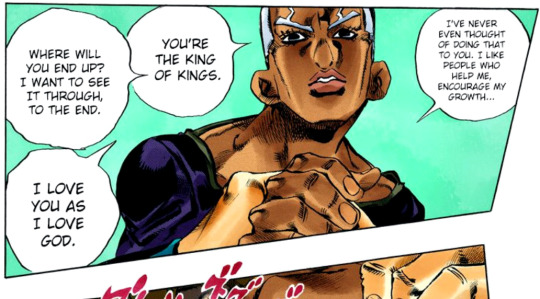
Is it forbidden to look for something in someone? Does it make it not genuine? No, we all look for something in a friendship. And this seemed like a fair deal for both. One needs a trusted friend, an ally, but not a blind follower, and as we’ll see later, he needs someone to help him transcend his human? vampire? condition again. The other one needs a reason to live, a quest to fulfill, and hope that he could one day obtain the ‘happiness’ and ‘peace of mind’ that Dio wants so much too. He’s also someone who strives for greatness, who wants to ‘step outside human boundaries’.

Not forgetting that Pucci is someone fueled by a profound curiosity and rationality, it is only natural that he’d side with someone who has the abilities and ambition Dio has. Framing Jolyne, killing people, stealing discs, it is all out of Pucci's agency, long after the death of Dio. He's actually the one who suggested he could store and use Survivor, and he’s the one who asked for it! Dio thought Survivor was useless, that it was only a weakness, and Pucci convinced him with the idea that it could be prove itself useful.



Pucci is shown to have ‘lost’ faith in Christianity very early on, maybe not really having true religious belief at all (as in, the actually believing there’s a God sense.) He got into priesthood for philosophical reasons (seeking answers to an existential question). He seems to be a very pragmatic christian with interests in science that contradicts some of the scripture’s theories.
I don't think calling the plan ‘Heaven’ was a bait based on Pucci's religious beliefs. Over Heaven isn't canon, but it shows Dio having a very Christian mother. He's an intelligent man, born in a very christian time and place, and thought ‘Heaven’ was the name of the kingdom promised to the legitimate ruler of the world, himself. If anything the first time they meet he makes it very clear they're not striving for anything Bible related but for realizing their full potential and finding happiness.
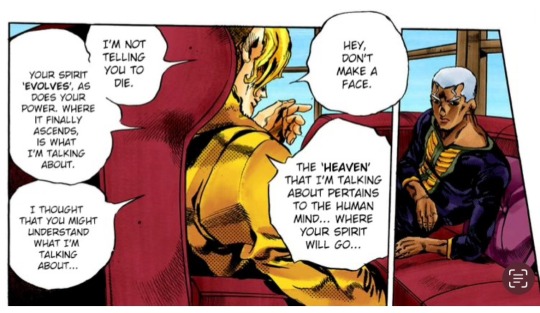
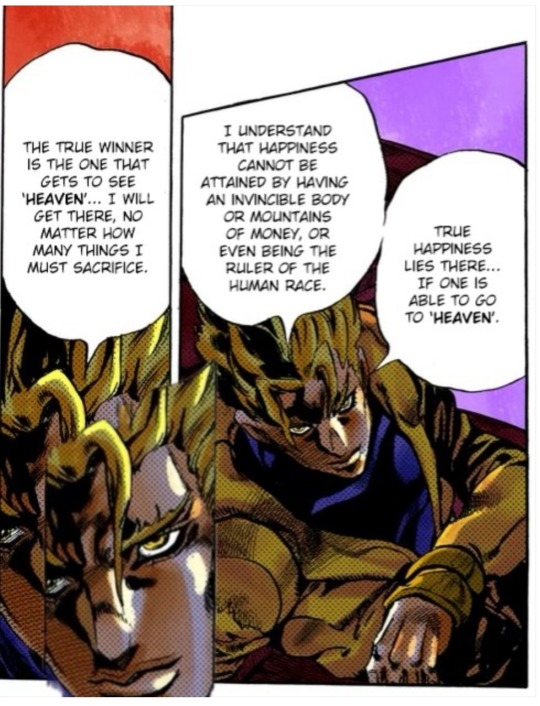
Dio saw very early on that Pucci was not a very faithful catholic, judging by the book he's reading when they meet in the ossuary, and then Pucci commiting crimes even before seeing Dio again (hiring someone to beat up his brother, leaving his brother as dead). He then commits blasphemy by calling him King of Kings and comparing his love to the one he has for God. Pucci does not think of Dio as God, he loves him as he loves God, but he's not blind and mistaken. He refers to him with proximity terms all throughout the manga (even when he's young), never used honorifics like the hunchmen do, calls him 'kimi' (casual/informal ‘you’), 'my close friend'.
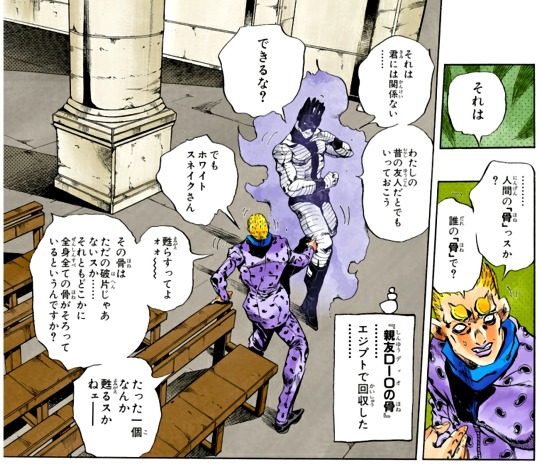

Even Dio uses ‘kimi’ instead of the ‘omae’ that shows inferiority that he uses with Vanilla for example. All throughout their scenes Dio is shown slightly seductive at first, then not as overtly seducing as he usually is, he’s talking about the plan, and strategy (even though he still maintains physical contact, I mean, it’s still Dio), and then seems to relax progressively by doing activities and chit-chatting, to the point of becoming paranoid that his weaknesses is known. Yes, Dio was pretty nice and not as big an asshole as usual because he needed someone for the plan, but what did he need? A "friend that he can trust from the bottom of his heart" (信頼できる友), so he tried to make one by not being an asshole, and guess what? He did! And he got scared that he managed to do so, because it's freaking Dio lol. Dio’s life has only been him trying to show dominance, and facing rejection. Heck he was rejected and degraded even when he won that chess game against an adult in the first minutes of the show. But everyone wants friends for a reason! Be it not to be alone, to be loved, to have someone to talk to about certain topics... And we all make efforts and try to be nice to make friends. That's not manipulation that's called not being a dysfunctional piece of shit like Dio usually was shown to be before he met Pucci. Why was he different with Pucci? I'm bringing up the parallel with the Jonadio scene which really show that Dio hasn't changed and is acting the way he always has, testing people, he just has never been met with trust and acceptance, only with rejection, unlike what Pucci has done from their first meeting and after :

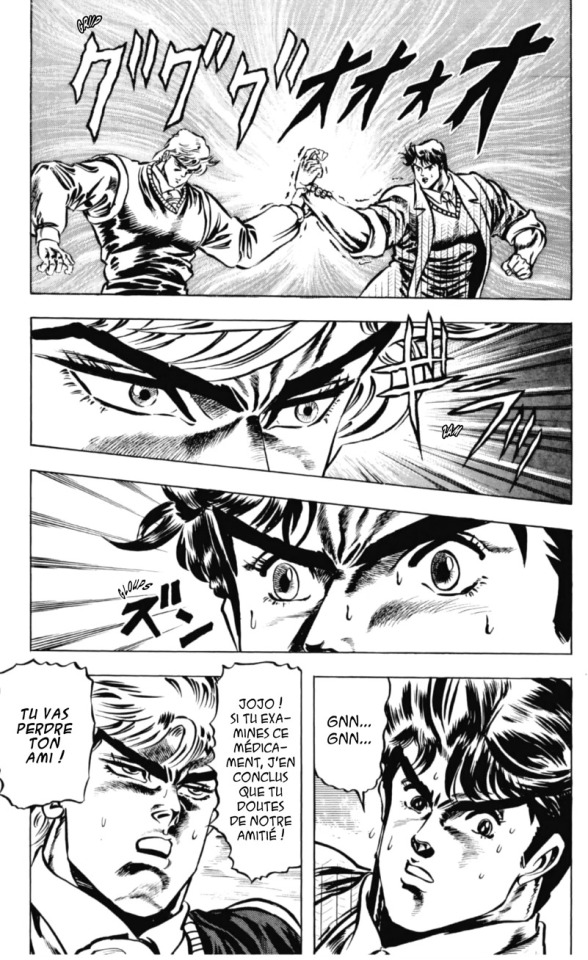
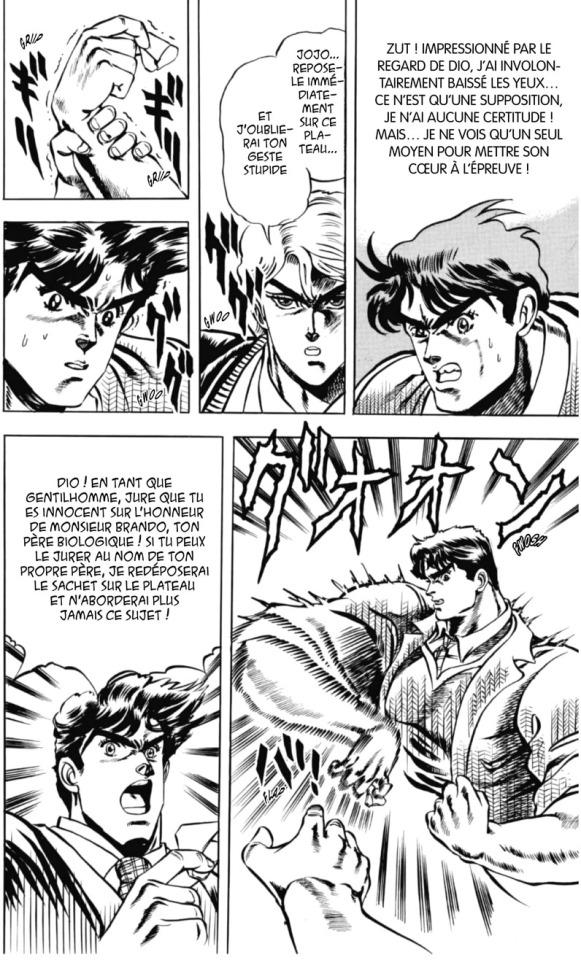
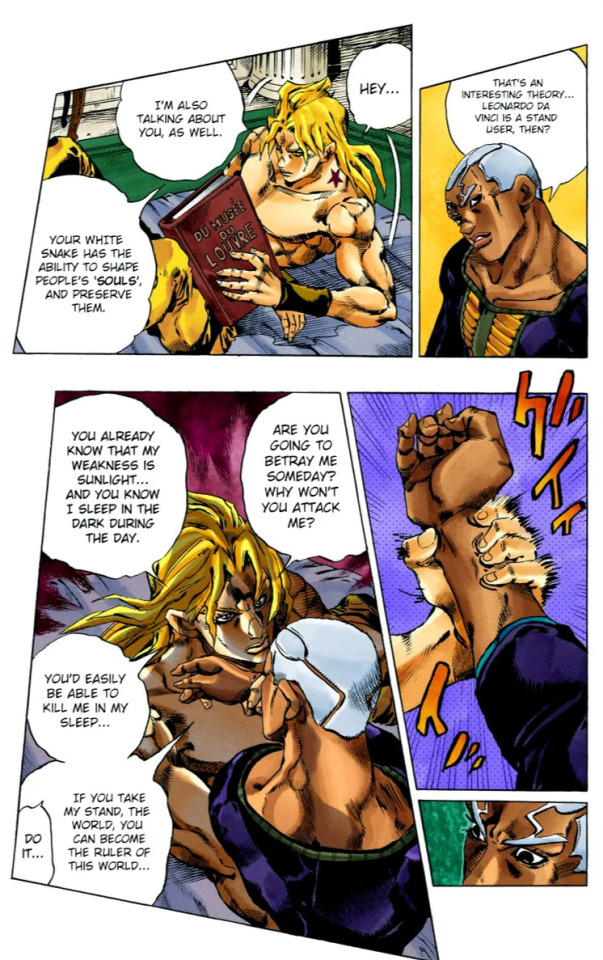
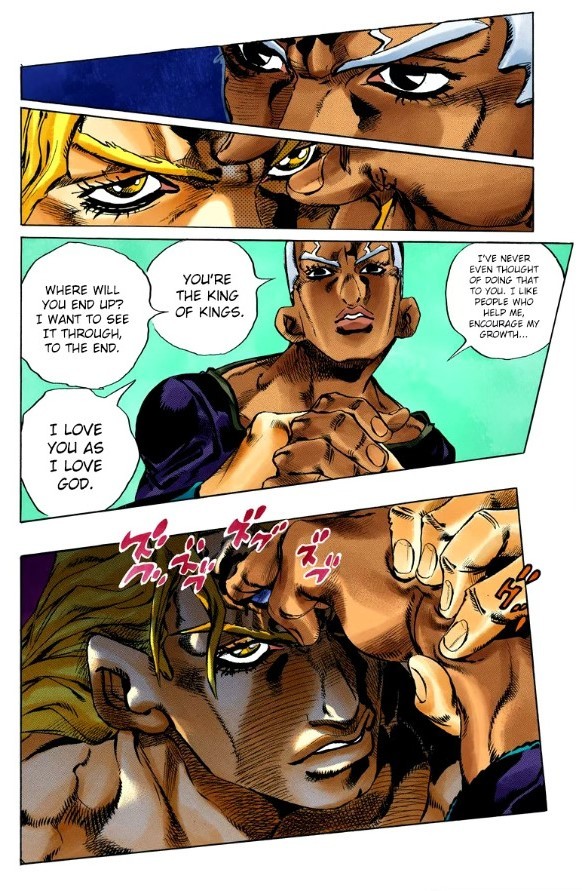
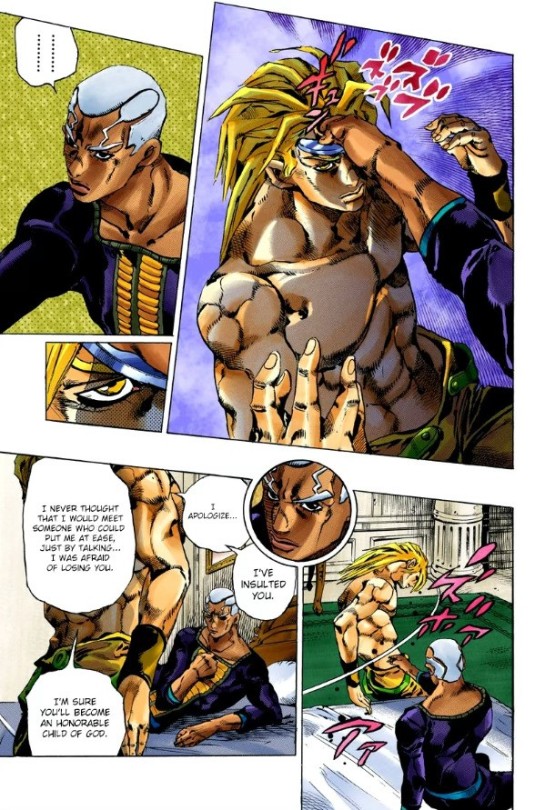
Scene plays out very similarly at first, except that this time Dio who hasn’t done anything wrong, but he was expecting to be betrayed and wasn’t, which led him to get paranoid and set up Pucci so that he’d attack him, which he didn’t. And what did Dio do? Apologize and give him a part of what's literally the most important thing he has, 'his' body.
The fact that Pucci kept his 'sentimentality' towards his friend (I quote), his obsessive affection for Dio, and hope in his plan for such a long time is easily understandable, he had everything to win from Dio's plan (which is very different from nothing to lose, he has quite a lot to lose!). He could be cleansed from his sin, or at least put everyone on his level, be granted the reward of unconditional love, he could grow to a close to godly status or be a messiah carrying god's will (be special, push the boundaries of being human), and maybe, just maybe revive his loved ones too! He could rewrite his destiny at best, and at worst, obtain peace of mind. If anything helping Dio might even have been an excuse for Pucci to lie to himself about his real intentions with this plan (unconsciously : finally accomplishing his destiny of being special over his sibling and basically everyone else, consciously : giving everyone the chance to prepare for tragedy + opening everyone's eyes to the fact that what he did, cause his sister's death, was not really his fault since it was written by fate all along.)
Now if you really have a high esteem of Dio's intelligence you can argue that he did it all on purpose, he gave out his weakness on purpose to mellow Pucci, he called the plan Heaven to cater to Pucci's faith, he talked him into doing crimes, pretended to feel equal/inferior so that Pucci would give him his trust... But 1) Dio's not that good at it, has too big trust issues himself and has other means for submitting people to his will (as seen with Kakyoin, Polna...), 2) it's literally written this has to be built on trust which in my opinion completely disqualifies a manipulation aspect to it. Of course there are many other sources that further the idea that they were really friends, I'm thinking about how their relationship is described in interviews or the Jojo Mag, but I wanted this post to focus on canon interpretation.
Thank you for reading my essay, I’m always happy to chat and comment on the dynamics between characters in the material. I am not willing to talk about morality or shipping discourse here so please refrain from sending me such comments.
76 notes
·
View notes
Note
Question: who was the Islamic philosopher you mentioned in that post? The one whose thoughts / works partially survived thanks to Jewish philosophers? I'm curious.
Also, on a broader note, it's interesting to think about: that even after death, even if some may try to destroy your work or erase your existence, there will still be other people who help your ideas live on anyway.
Ibn Rushd! Also called Averroes in the West. His books were translated into Hebrew and "inspired a renewed interest in the interpretation of scripture and the Jewish religion" (from Reopening Muslim Minds). The famous Jewish philosopher Maimonides was a fan of his! Christians were also inspired (specifically by his commentary on Aristotle) but the Catholic Church was not a fan. Especially about ideas like "women have the same intellect as men and should occupy the same positions in society men do, including as rulers, and its only because society wont educate them that they don't know things, and this makes our countries worse." He was also extremely pro-philosophical questioning & thought the Quran should be read allegorically.
165 notes
·
View notes
Text

What makes a Jesuit boys’ school so entertaining is the irreverence in the face of certain damnation. There were adult authority figures, some imbued with the ability to forgive Mortal Sin, telling us we were going to Hell if we didn’t take our morality seriously. In response, we laughed and cracked jokes. We laughed so hard, in part, because the stakes were so high. If you could mock the Most Important Question, you could likely laugh off anything.
Humor was what opened me up to the idea that I didn’t share the values of the men teaching me to be a “good” person. Humor also taught me that I didn’t have to accept any of it.
The first time I heard shade thrown at the Theology department was during my freshman year when my favorite teacher sitting in a room in the fourth floor English department, in an entirely separate building from the Theology and History classrooms asked “what movie are they showing you over there this week?” It was true that for half the year, Theology teachers showed movies 40 minutes at a time to make important philosophical points. They screened The Matrix, Life is Beautiful (watched in tandem with our reading of Man’s Search for Meaning), and, my personal favorite The Shawshank Redemption which they showed to us in the summer before 9th grade to let us know what Jesuit school would resemble: something close to surviving solitary confinement. If you had music in your mind, you might make it out. I don’t doubt the efficacy of showing these movies to us to teach moral lessons. It was a better strategy than trying to force teenagers to read. I had never heard anyone mock the department, though, especially not another teacher.
To be clear, this scrutiny, at least of the lay teachers in the Theology department was justified. They fed us one-sided anti-intellectual drivel that had almost nothing to do with Catholic Dogma. Instead of learning about a biblical text, we spent hours listening to a guy tell us evolution was “just a theory,” that being gay was a choice, and that abortion was wrong in any instance (whatever your personal beliefs, understand that it’s kind of hard to hear both sides of that argument at an all-male school where the adult men were the authority on ethics). Then they showed us clips from Fox News of Terri Schiavo and told us the “correct” Christian response to the news.
One day, again in my freshman year when I was scared to question anything because of an inordinate fear that I could be thrown out of school at any moment, our Theology teacher pressed play on The Emperor’s Club (a 2002 Kevin Kline movie about a boy’s prep school that served in our teacher’s mind as some ethic antithesis to the more beloved (and frankly more entertaining) Dead Poets Society). A student in the back row raised his hand, and our teacher paused the movie. We sat in the dark room and rolled our eyes. Make this quick, buddy. We’ve got a movie to watch here!
“Jeff?” our teacher said, lifting his eyebrows.
“Yes, I was wondering about the prayer we read before class today,” Jeff said. He was a senior, a bit portly which was only noticeable because many kids did not bother buying new dress shirts every year. Once the stress of school forced you to eat your feelings four years in a row, you wound up with a gut putting pressure on your old shirts’ buttons. “It says in the prayer…” Jeff continued, “that Jesus descended into Hell. What’s that about?”
“Well,” our teacher said, looking excited to finally talk about religion instead of answering some weird kid’s question about the ethics of having sex with aliens should they ever land on Earth, “according to scripture, we know the gates of Heaven were closed for a time, so when Jesus died he descended into hell first to free other righteous souls…”
“Yeah, a quick follow-up on that,” Jeff said, sounding interested, “does anyone believe this shit?”
The cackles that erupted in the room nearly overwhelmed our teacher’s angry tirade. Jeff was sent to the Vice Principal’s office to await his judgment. It hadn’t occurred to me until that moment you were allowed not only to question those teaching us about religion but you were allowed to reject the faith altogether.
From there, every argument began to collapse, mostly through funny moments:
A teacher tried to tell us IVF was wrong because “you have to jerk off into a cup. It’s not right.” One kid announced: “I’ve done weirder!” Guffaws. Cheers.
Another teacher claimed gay sex was always wrong because the sex itself was not ‘open to creating human life,’ to which a brave gay student volunteered “Oh, I’m open to it. I’ll keep trying and let you know if there’s a miracle.” Applause.
When a teacher said video games could be considered a sin if they distract you from work, someone, half-asleep in the front row, let out a loud “Ah, shut up!” that made us all giggle.
My fellow students weren’t playing the game, arguing with the teacher on his terms, using logic. They were dismissing the arguments flippantly, and no adult could reply unless they were funny themselves.
Read the rest here.
#funny#lit#lol#writing#dan wilbur#essays#essay#long post#long reads#atheist#atheism#religion#catholic#catholic school#literature#humor#better book titles#books#reading#memoir
17 notes
·
View notes
Text
Recovering the maternal in art
Thoughts on Hamlet #1
A crazed rant on Hamlet, art in modernity, Susan Sontag, and female power in Christian theology

The feminine urge to be daddy's mommy. — — Natalie Wynn, Contrapoints
This is the first of my series of meditations based on Shakespeare’s Hamlet, which I have been studying as part of English literature A-level. It is the basis on which I expand into wider general reflections on culture and philosophy, linking to other things I’ve read or watched recently.
This piece begins as art criticism about excessive author presence in modern art, with allusion to Hamlet as an embodiment of such modern artist. But then it kind of diverges into a theological tangent and ultimately an argument about gender and female power in Christian myths.
It doesn’t really neatly belong to any specific literary category. It is essay-like, but is full of poetic logic. Perhaps just read it as a kind of unhinged diary entry or notes app notes that should have stayed in the drafts.
— — Z
1
Modern authors, perhaps due to their peculiar awareness of themselves as authors, have felt this exceeding sense of self-inflicted obligation, that they have to force their authorships onto the audience, to make them aware that what they’re seeing, is in fact, created by them. And not just by the world.

‘What a piece of work / Is a man!’ Hamlet, II, ii, 301–302
What I mean by this could be seen most obviously in the attempt that modern authors try to push “message” into their works, or simply the conscious attempt to have any message at all. Consciousness is really the crime here. There is a kind of forcedness in modern art, a lack of the grace, the relaxed effortlessness that is so prevalent in classical, canonical art. Modern art is always agitating, in a permanent state of anxiety and uncertainty in whether it has “correctly” communicated its message to its audience.
Notes: Hamlet is seen by many as Shakespeare’s most philosophical play, his most message-heavy work, with deep contemplations on the nature of existence.
The long soliloquies of the eponymous prince has long been described as rigorously academic in style, perhaps most famously, in the ‘to be or not to be’ soliloquy. It is the most decontextualised soliloquy uttered by the prince, in which he solely speaks on the conceptual matters of life and death.
Yet this intellectual aspect of the play might perhaps what Shakespeare precisely is trying to satirise here. A tormenting, self-cannibalising, painful intellectual interiority, emerging in the early modern West, with its deep Christian moralism and inhuman rationalism, is here presented as precisely what drives the main character, and those around him, into misfortunes.
‘O, what a rogue and peasant slave am I!’
Hamlet, II. ii. 538
The dramatic forcedness of Hamlet's messaging is perhaps most evident in the almost ravage-like scene in Gertrude's chamber (III, vi), in which he almost embodies the incestuous and murderous Nero.
'Let not ever
The soul of Nero enter this firm bosom.
Let me be cruel, not unnatural.'
III. ii. 366-368
Susan Sontag said that art should be flirtation, not rape. Well, many modern art feels like rape to me. They feel like rape in the way that they try to force one singular thing onto its recipient. It refuses a defused, tender sensuality that slowly transmits and triggers desires through a landscape of polyamorous tenderness. Instead, it is strictly patriarchal, scriptural, the word of the Father, of God, Author The Creator. There is a violence to it. But more so there is a naivety to it.
The violence is in the naivety. In its brutal attempt to not appear naive, but rather adultly, scholarly, fatherly, like the son who resolves the Oedipus complex by identifying with the father to escape the fate of castration. The dwarf dressed in the giant’s robes.
‘But two months dead — nay, not so much, not two-
So excellent a king, that was to this
Hyperion to a satyr, so loving to my mother
That he might not beteem the winds of heaven
Visit her face too roughly. Heaven and earth!’
‘My father’s brother, but no more like my father/ Than I to Hercules’
Hamlet comparing his father to his uncle, the current King Cladius, and himself, I. ii. 138–142; 153–154
This is the modern author. The anxious son, boy, fearing castration, if not already castrated, living in the shadow of the father, haunted by him, resenting his mother, the wanton, the whore, the true artistry of the world.
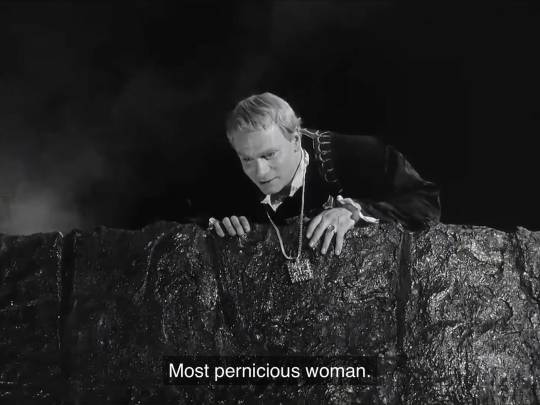
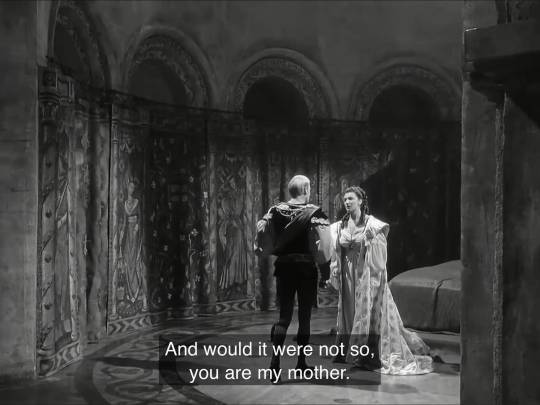
Hamlet (1949). Laurence Olivier
True art is always promiscuous. She is the Saint of All Sins. The Virgin in the Brothel. The Whore in the Church. The Holy Witch. The High Priestess of Filth. She is a woman. She is mother. The Oracle (whose words are obscure because they’re divine, not to Him the God, but the real, hedonistic god of music and joy, through whom she is enlightened in darkness). The Sea. Shall I moor tonight in thee.

Twilight, Contrapoints, Natalie Wynn
He, the God, and Her, Nature, whose fundamental battle is once again reenacted in this.
Genesis 1:2, the Spirit of God moved upon the face of waters. God moved on top of the sea, God on nature, man on woman, reason on art, this is the fundamental violation, the real original sin, the forbidden fruit of knowledge, brought forth by Himself through his very presence. The fault of the Fall is not in us. It is in Him. For to be holy is to be aware of the profane, as the opposite is equally true. Therefore to be profane, to be sinful, is precisely to be aware of the existence of the hallow. To learn about it. To aspire to it. Without sin, there would be no God. Like there would be no man without woman.
‘Whatever is the subject of a prohibition is basically sacred’.
‘The taboo does not banish the transgression but, on the contrary, depends upon it, just as the transgression depends on the existence of the taboo: “The transgression does not deny the taboo but transcends it and completes it”.’
Georges Bataille, Eroticism: Death and Sensuality
‘That discourse one might call the poetry of transgression is also knowledge. He who transgresses not only breaks a rule. He goes somewhere that the others are not; and he knows something the others don’t know.’
Georges Bataille, Story of the Eye
Notes: St. Augustine of Hippo wrote that original sin is transmitted by concupiscence and enfeebles freedom of the will without destroying it. But isn’t will also what precisely drove one (Eve) to the origional sin? Perhaps the will is much like Kant’s conception of freedom, a thing that creates its own limits.
Without an elusive ideal to aspire to, we will never be aware of our skin-felt wretchedness. The fruit is not only planted by God, it is God, it is God who eats the fruit, it is God who is the fruit being eaten, and it is God who is watching all of this.
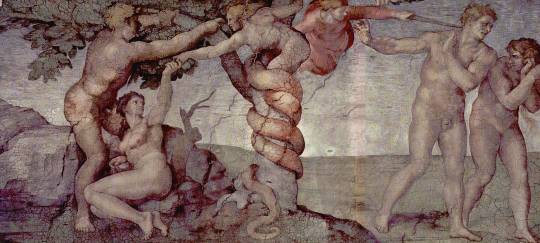
I find it interesting. The closeness between the angel and Satan. Almost mirror images. In Michelangelo’s painting of the sin of Adam and Eve from the Sistine Chapel ceiling.
The decision to have the woman be the one to eat the fruit therefore, is interesting, on multiple levels. She is the original sinner, but also the one closest to God. For the fruit is God, but the fruit is also sin, and it is through the death of the man that she (gives birth to) achieves salvation. She is sin, but she is sin in grace, the glorified sin, the sin made divine, the virgin who gives birth, saved from stoning (here she also mirrors the other Mary, the other permitted sinner, Mary Magdalen), who gives birth to the man who is going to die, through which she successfully redeems herself. She is the mother, and she is the sinner, the original in both, and in both she is holy.
Eve is Mary and Mary is Eve.
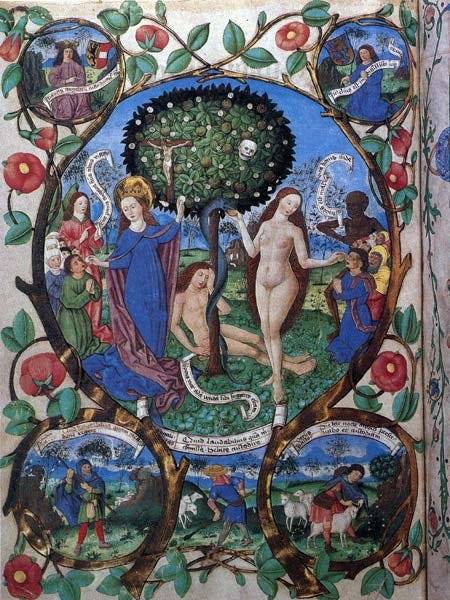
The tree of death and of life in the Salzburg Missal: Eve gives the representatives of the old covenant the fruit that brings sin and death from the tree of paradise. Mary, on the other hand, gives the faith hosts, the bread of life. — — The New Eve (Latin: Nova Eva) is a devotional title for Mary, the mother of Jesus. Since the second century, numerous Eastern and Western Church fathers have expressed this doctrinal idea as an analogy to the biblical concept of the New Adam.
The man is essentially an accessory to her, a passage through which she penetrates through to achieve her eventual goal. He is only a thing that she decorates herself with. The baby in her bosom. The man on her laps (Pietà). The feminine urge to be daddy’s mommy. The gravedigger, whose death goes unmentioned, outlived everyone. Her blue robe is serene, like the halcyon sea.

Sandro Botticelli’s Madonna and Child, painted in 1480, shows a reflective Mary in deep blue.
Z
17.03.2024
(with notes later added 24.03.24)
Source:
Susan Sontag, Against Interpretation, On Style, The artist as examplary sufferer
Natalie Wynn, Contrapoints, Twilight
Georges Bataille, Eroticism: Death and Sensuality, Story of the Eye
Janet Adelman, Man and Wife Is One Flesh: Hamlet and the Confrontation with the Maternal Body
I have also posted this on Medium.
#shakespeare#hamlet#oedipus complex#literature#feminism#catholic core#philosophy#contrapoints#natalie wynn#twilight#georges bataille#eroticism#susan sontag#art criticism#art#literary analysis#literary criticism#diary#rambles#the virgin mary#symbolism#renaissance#ideas#theology#women in art#thoughts#oedipal complex#freudian#mommy issues
14 notes
·
View notes
Text
Lectio Divina and How That Looks in My Praxis
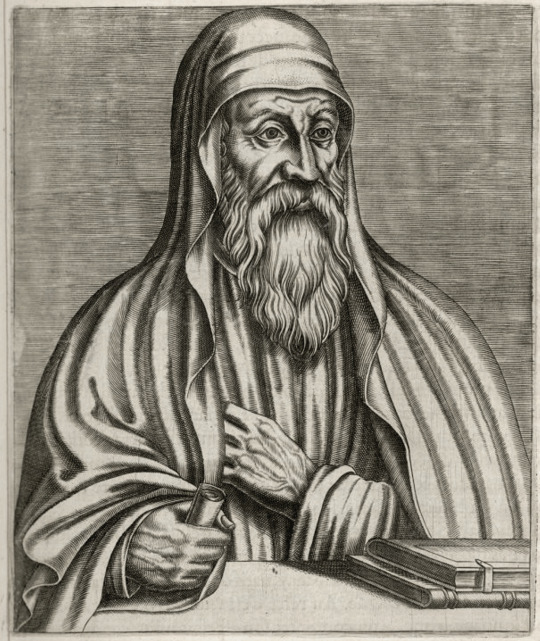
Lectio Divina is a Christian meditative practice within the mystical circles of the faith. It is Latin for “divine reading.” These more esoteric interpretations and scriptural practices were believed to stretch as far back as the 3rd century CE by Origen of Alexandria (185CE—253CE). The four-step method we know today was formalized by the Christian monk Gugio II in the 12th century. Not sure when the fifth step was added, but given that Gugio was a monk, I guess it makes sense why he would stop just at four.
So, when diving into wordy, philosophical texts such as the Dao de Jing, or Corpus Hermeticum, one may obviously want to pursue these texts from an analytical and intellectual perspective. While that kind of point of view has its time and place, it indeed “misses the mark,” so to speak, on what and how these texts should be read and experienced. Now Hanegraaff proposes that early academics viewed the Hermetic corpora as nothing more than a “literary phenomenon” with no actual practitioners. This was obviously due to how these texts didn’t seem to have canonical views and that the texts do not display a dogmatic structure resembling something like Christianity or Islam. He proposes that there was indeed a Hermetic Spirituality rather than some modern example of a “school of hermeticism” with many students diligently copying notes. This is evident in the only known “Hermetic practitioners” we can name today: Theosobia, Zosimus, and Iamblichus. We indeed see that Hermeticism was just as practical and involved much praxis as philosophical thought. I can’t say much about the scholarship in Daoism, but we have more evidence of Daoist praxis of which is heavily tied to Chinese folk magic.
From the beginning of my journey, I knew Hermeticism was right for me, it took me about a year to really settle into it and solidify my praxis around a Hermetic framework, so I wish to keep it that way. One thing I know that I, and a lot of other people I converse with, sort of mirror traditions and faiths that really embody what a Hermetic praxis looks like, as the evidence for what I have, as a Hermeticist, is that of the teachings of Iamblichus and Zosimos to Theosobia. We know philosophy and reading was prerequisite for Iamblichus in his apology of Theurgy in his Response to Porphyry, but mere intellection alone cannot raise us up to the gods and ultimately to the Platonic Forms. “…for it is not pure thought that unites the theurgist to the gods.” (DM II.11). For Iamblichus, intellectual pursuits were not the primary goal to us to return to the gods.
To put that off the way, what are the four steps to Lectio Divina as established by Gugio II? They are as follows (Latin on the left—English on the right).
Lectio—Reading
Mediatio—Meditation
Oratio—Prayer
Contemplatio—Contemplate
And the Fifth step is Actio- Action.
I will link another article explaining these steps in more detail, under a Hermetic understanding, as the purpose of this musing is just to reflect on what this practically looks like in my practice. (See my Twitter page for the link).
Before I begin my Lectio, my readings, I start with a prayer. This prayer was gifted to me by a friend many months ago, and I have edited it since then. My version of the prayer is as follows:
O God, teach me gnosis so I may know you in all your holy forms. Grant me the essence of the Prophets’ understanding, the eloquence of their memory, and the quick comprehension of your archangels. O God, bless me with your light of wisdom and quick experience, liberate me from the darkness of doubt, and open the fates of your light, O God of the Worlds.
Likewise, here is a Taoist mantra to recite before you begin a Lectio Divina, translated by a friend from a Taoist Discord Server:
誦經密咒
貪羅鬱羅,符無蘇陀。太沖太極,陰陽抱和。
出有入無,鬼神莫測。出生入死,變化自然。
元始混炁,玄中之玄。上干有頂,下洞太淵。
誦之一徧,沈痾自痊。鍊魂育魄,真陽自全。
齋戒禮誦,萬過飛仙。無上密咒,萬神綿綿。
心中心咒,重得宣傳。貪羅洞盟,與道合真。
玉清上極,梵炁氤氳。分靈布炁,降注臣身。
形神俱妙,變化飛昇。一如令格,統攝萬靈。急急如律令。
English:
"Recite the secret mantra, (the name of the mantra)
The entanglement of desire and sorrow, talismans offer no aid..
Supreme void, supreme polarity, yin and yang embrace harmony.
Outward is being, Inward is non-being, ghosts and deities can’t find or predict it.
Outward is life, Inward is death, it's natural transformations.
Primordial chaos energy, the mysterious center of the mysterious.
Above, reach the celestial peak; below, touch the deep abyss.
Recite it throughout; ailments self-heal.
Refine the Hun, nurture the Po, true yang becomes complete.
Abstinence, chanting, transcend the mundane.
Supreme secret mantra, myriad gods abound.
The mind that stays centered and be with the mantra, will attain the state of legend.
The net of desires has holes, united with the true Tao.
Jade purity ultimate ascent, Silence energy pervades.
Share spirit and give energy, descend it down to my body.
Form and spirit are both wonderous, transformations soaring.
Unified like the command, encompassing myriad spirits.
Please follow my orders."
This prayer is only said with the purpose that I will be “divinely reading” a chapter from the Corpus Hermeticum or Dao de Jing.
After reading a chapter from either text, I will meditate on them. The way it is described within the Christian tradition, this looks like after just basely reading the texts, you revisit the quotes and passages that didn’t make much sense or the passages that resonate with you, and the goal is to explore those feelings that are invoked in the reading. Here, I employ an act of pondus, Latin for pondering. This stage of the Lectio Divina in my praxis involves much emotion and self-reflection brought about by revisiting and further pondering those chapters and passages I have just read.
After my meditation, we enter the Oratio (prayer) step. I repeat the same prayer from above and further pray; since today is Tuesday, and I honor Anpu on Tuesday, I will continue with prayers in accordance with the great god of the scales. I observe a deity every day of the week, as this helps me keep my praxis more organized than praying to many deities every day. These prayers will include pre-written and informal ones to the god to help me further understand the words I have just read and meditated on.
Next, we come into Contemplatio. The way this looks for me is after reading a chapter and further pondering the passages that struck me as odd or true, I equip my shroud and gown, sit in the dark with earplugs, close my eyes, and meditate and sit with those words. So if I finish reading chapter 37 of the Dao de Jing, the terms and phrases I have underlined, such as: “Listen, with this unvarnished simplicity without a name, there will be no desires. Without desires, there will be peace, and all under heaven will be settled independently.” I will meditate on these words, silently reciting them repeatedly for 10-20 minutes.
When the rain noises on my phone alert me to return to my senses and close out the Cotemplatio stage, Gugio II would have me stop here. But like I said, there is a 5th step to this Lectio Divina Process, and I’m not sure when this 5th step was added. Regardless, I now enter the Actio phase. How does one put these words that we have effectively eaten, chewed, sat with, and digested into action? This four-step process brings about a great humility of the heart and soul. So when one effectively participates in a “Divine Reading” as prescribed with the guidelines proposed by Gugio II, this great humbling leads to greater and more discoveries of the Self, I purpose. As I’m struck with a great sense of humility, I am called to act for myself and better myself. Let’s return to chapter 37 of the Dao de Jing, how to be “without desire” in the mundane, everyday world? Whenever I’m struck with great passions and desires, whether positive or negative, I refer to the simplicity of reciting surahs and Hermetic maxims to help me return to a “desireless” state of mind. To what degree do I come “desireless”? Well… it’s not much. But the purpose here is to actively take our readings and intellects and apply them for something greater than ourselves, something ineffable and so transcendent it can’t be spoken of; for even the one who has come to understand The Great, i.e., God cannot speak on it. (SH 1)
42 notes
·
View notes
Note
What's your relationship with religion and how has it changed over the years? Do you, still consider yourself religious, or follow any religion? How do you think, your history with religion has affected your life as a vampire, esp in the beginning?
Broadly, I still consider myself a follower of the Christian faith. I can still confess the Nicene creed and mean every word. I find the concept of a triune God intellectually fascinating and philosophically satisfying, and I still find an unusual degree of solace when I enter a church sanctuary—it is something I enjoy doing, and something which my children find equal parts amusing and annoying.
I was already rather at odds with the way my father practiced Christianity when I was a hot-headed young man, and when I entered my new life, I was highly susceptible to thinking more expansively about the role that belief ought to play in my life and in the world writ large. My new life has allowed me the time, resources, and intellectual capacity to explore things I would never have been able to as a human and to find value in far more belief systems than merely my own. And in the nearly three hundred eighty years I have lived, I have witnessed again and again the struggles borne of differences in belief, and as I have read and re-read the sacred texts I grew up with, and the sacred texts of those I was once taught were heretics, I have grown to believe that whatever it is that it is desired of us, it is not this violent disunity.
I worship formally infrequently; I devote only one night per year to the practice of prayer, though at times I pray spontaneously. I rarely attend a worship service, though as my wife noted recently, at times we attend on Easter. I don't make a regular habit of studying the Christian scriptures, but sometimes I read the week's lectionary because there's some very small part of my mind which remembers the rhythm of the cycle and finds comfort in it. But those practices are borne of my own particular history, and I long since have abandoned any idea that my own spiritual practice might be superior to those of any others. I may consider myself a Christian but I no longer—and if I am honest, never did—consider that path to be the only way to encounter the Divine.
Finally, becoming an immortal also allowed me to have a family. And in my love for them, I have come to more fully understand the relentless love of God. As a result, though it is by all accounts improbable, I try to live my life in response in fervent hope that the love I believe exists for humanity still somehow might exist for me.
15 notes
·
View notes
Text
Other historical-critical conspiracy theories I think are probably true but can't prove:
Moses is not only not a historical person (not controversial), but the entire Joseph-Moses tradition is post-exilic. Isaac and Jacob are unrelated hero cult figures, and Abraham was invented as a syncretism after the fall of the "Northern" Kingdom.
The original readership of the two works that make up the Quran did not think they originated from Muhammad, who was a military leader. The person who wrote the more homiletic suras was aware of Christian doctrine but hadn't read the bible.
No one who wrote any of the Christian Gospels had ever been to Judea. The Marcionite versions of the Pauline Epistles and the Gospel of Luke are the originals. No one who wrote any part of the New Testament could read or speak Aramaic, and Jesus didn't speak Greek, so none of it originates with him. Pontius Pilate killed Jesus because he wanted to.
Every extra-scriptural tradition corresponding to the above three religions is pure fiction that was invented for doctrinal reasons, none of which originates from any oral tradition.
The mystery plant mention in the Vedic rituals called "Soma" is ephedra and the only reason this isn't obvious is that the Samaveda traditions originated in a place where ephedra actually grows rather than in India. It's also a stimulant which may not be compatible with the later traditions about it but fits the Vedas themselves just fine.
Prior to Adi Sankara, nobody thought of the upanishads as constituting a single body of literature. The "astika" schools are a post hoc categorization that was applied to a heterogeneous corpus of much earlier literature based on what happened to survive.
The gymnosophists that Alexander the Great encountered in india aren't Jains or Buddhists and don't correspond to any other coherent religious or philosophical group we would recognize either, none of which formally existed yet. Buddhism was formalized with the founding of the Maurya Empire, and Jainism as a coherent entity is much later.
The Homeridae were called that because they were initially formed from the sons of captives taken in war. Homer is a back-formation that was invented when the initial etymology was lost.
The Athenians greatly revised the Iliad and Odyssey for use in the Panathenaic festival to emphasize Athenian traditions, especially in the Odyssey. Most manuscripts of these poems that the Alexandrian librarians used to compile their editions originated from Athens, which means ours do too.
The philosophical dialogue format originates from Ancient Greek tragedy, which itself originates from the performances of the Homeric poems in the Panathenaea. It didn't catch on outside Athens, and fell out of favor even there as most philosophy students in the Hellenistic period were literate.
Plato's immediate successors, Speusippus, Xenocrates and Polemo, greatly revised and edited many of Plato's dialogues prior to publication. Only the 15 works cited by Aristophanes of Byzantium were initially intended by themfor wider publication. Much of the received text of these dialogues is unmarked commentary, which explains the stylometric and doctrinal differences. The other dialogues weren't published until Sulla sacked Athens.
Whoever wrote Aristotle's "esoteric" works, it wasn't him, and the reason that the later peripatetics, even the ones who knew him well, don't refer to these works is they weren't aware of any such texts by Aristotle.
Origen the Christian philosopher and Plotinus the founder of Neoplatonism were both taught by the same Ammonius of Alexandria, and the reason that Porphyry mentions an "Origen the Pagan" as one of Ammonius Saccas' students, while Origen claims his teacher was a Christian named Ammonius is that Origen lied about being a Christian.
18 notes
·
View notes
Note
I’ve been inquiring into Orthodoxy for a few months (coming from protestantism) and I don’t know for certain yet if I will choose to convert, I guess because I have a few hangups. I attended Divine Liturgy at my local parish for the first time last week and intend to continue worshipping with them and talking to the priests there, but I figured I would bring my questions to you as well.
I’ve been watching interviews and talks from Dr. Jeannie Constantinou, who seems absolutely brilliant and I love her. I’ve heard her explain at least 5 different times now this notion of “phronema,” basically the mind of the Church (the mind of the Apostles, as taught by Christ) and how the Eastern phronema is so different from the West because of the West’s emphasis on human reasoning. I appreciate mystery; mysticism and apophatic theology is what attracted me to Orthodoxy in the first place. But while denouncing Western appeals to reason and emphasizing appeals to Tradition and the mysteries therein, two examples she brought up were same-sex marriage and universalism, basically saying that no matter how reasonable an argument one might make, it’s not Tradition and therefore invalid.
While I’m honestly not sure what to believe about homosexuality (I have pro-LGBT leanings personally but am unconvinced either way I guess), I believe in a “Biblical Universalism,” the idea that Hell is temporary and ultimately corrective rather than punitive, like a furnace to purify gold of any dross. It makes the most philosophical sense to me, I see it in the Scriptures, and (most importantly in this context) I see it as historical.
I’ve read a summary of the points brought up in the book “Universalism, The Prevailing Doctrine of the Christian Church During Its First Five Hundred Years” by John Wesley Hanson and found them to be very compelling. It seems to show that universalism ought to have been preserved in Tradition, but for many reasons did not, and instead the idea of eternal torment in Hell has solidified.
Now we’re in a spot where the likes of the brilliant Dr. Constantinou is saying that, no matter how reasonable a stance like this might seem, we cannot rely on our own reasoning, as she appeals to the Apostolic Tradition. Truly, I don’t want to be prideful or arrogant, and I wish to conform my thinking in all ways to Christ. But it seems that such a stance should have been Tradition all along.
Please, how can I reconcile this? I think I want to participate in the Orthodox life. I like your worship, your prayers, your fasting, your asceticism, your mysticism, and (the bulk of) your theology. I think Orthodoxy is likely the closest to ancient Christianity. But must I take your tradition as wholly infallible? Is this an issue I need to humble myself on and conform to, or can I truly be welcomed if this is my view?
Tradition isn't "wholly infallible" because, for the most part, it was created by man. In general Orthodoxy teaches that, although we do have all we need for Salvation, some things we do not know for sure and that sometimes we must rexamine said tradition for new truths. Homosexuality wasn't really explored by the early fathers because homosexuality as we know it didn't exist. I think people see the Bible (and the words of the Church Fathers) as too black and white rather than something nebulous and deep. A common belief in the Orthodoxy of the people is something called "Hopeful Universalism" wherein those who believe it (myself included) argue that because God is infinitely loving and good then he would likely wish to reconcile all sinners to him but that we cannot know for sure and that free choice presupposes that there must be an option for those who might never choose to reconcile. You'll find that Orthodoxy has a lot of variation in belief, just ask about our infinite arguments over if Toll Houses are literal, a metaphor or heresy! I think you're a lot like me my sibling in Christ and I'm still here! Keep at it my friend.
9 notes
·
View notes
Text
Saints&Reading; Wednesday, April 10, 2024
march 27_april 10
VENERABLE HESYCHIUS OF JERUSALEM (C.408)

He was a priest-monk renowned in the Eastern Church as a theologian, biblical commentator, and preacher. He played a prominent role in the 5th-century controversy on the nature of Christ and was acclaimed as having annotated the whole of sacred Scripture.
Serving as a priest in the church in Jerusalem c. 412, Hesychius gained repute as a theologian and catechist so that by 429, he was recognized by chroniclers and the Orthodox Mēnologion (lives of the saints liturgically arranged by month) as the pre-eminent biblical interpreter and teacher of the church in Jerusalem and Palestine.
Most of Hesychius’ writings have been lost, although scholarship in the second half of the 20th century continues to identify more of his works hidden among Greek manuscripts and Latin translations. His biblical commentaries include interpretations of the Old Testament books of Leviticus, Job, Isaiah, and Ezekiel. A celebrated moralistic annotation on the Psalms that had long been attributed to the 4th-century spokesman for orthodoxy, Athanasius of Alexandria, is now acknowledged as Hesychius’. Some earlier commentaries of probable authenticity contain germinal terminology of the heterodox Nestorians.
As a biblical exegete, Hesychius generally followed the allegorical method of the 3rd-century Christian theologian Origen of Alexandria. Hesychius’ preoccupation with symbolism led him to deny that a literal meaning could be found for every sentence in the Scriptures. In order to avoid heretical interpretations of Scripture, he rejected such philosophical terms as person, essence, or substance to express doctrine on the nature of Christ. On this point, he allowed only the term logos sarkotheis (“the word made flesh”), a biblical concept. Against the diminution of Christ’s divinity by Arius and his Antiochene followers, he veered toward the view of the Monophysites.
Credited with the earliest known liturgical addresses on the Virgin Mary, Hesychius also wrote a church history after 428 that controverted Nestorianism and other heretical beliefs. This text was incorporated into the second Council of Constantinople proceedings in 553. The works of Hesychius were published in the series Patrologia Graeca, J.-P. Migne (ed.), vol. 27, 55, and 93 (1866).
Source: Encyclopedia Britannica
THE MONKMARTYR EUSTRATIUS OF THE KIEV NEAR CAVE (1096)

Martyr Eustratius of the Caves was born in the eleventh century at Kiev into a wealthy family. As an adult, he received monastic tonsure at the Kiev Caves monastery, after giving away all his possesions to the poor. Saint Eustratius humbly underwent obediences at the monastery, strictly fulfilling the rule of prayer and passing his days in fasting and vigilance.
In 1096 the Polovetsians captured Kiev and ravaged the monastery of the Caves, doing away with many of the monks. Saint Eustratius was taken into captivity, and was sold into slavery with thirty monastic laborers and twenty inhabitants of Kiev to a certain Jew living in Korsun.
The impious Jew tried to make the captives deny Christ, threatening to kill those who refused by starving them. Saint Eustratius encouraged and exhorted his brother Christians, “Brothers! Let none of us who are baptized and believe in Christ betray the vows made at Baptism. Christ has regenerated us through water and the Spirit. He has freed us from the curse of the Law by His Blood, and He has made us heirs of His Kingdom. If we live, we shall live for the Lord. If we die, we shall die in the Lord and inherit eternal life.”
Inspired by the saint’s words, the captives resolved to die of starvation, rather than renounce Christ, Who is the food and drink of Eternal Life. Exhausted by hunger and thirst, some captives perished after three days, some after four days, and some after seven days. Saint Eustratius remained alive for fourteen days, since he was accustomed to fasting from his youth. Suffering from hunger, he still did not touch food nor water. The impious Jew, seeing that he had lost the money he had paid for the captives, decided to take revenge on the holy monk.
The radiant Feast of the Resurrection of Christ drew near, and the Jewish slave owner was celebrating the Jewish Passover with his companions. He decided to crucify Saint Eustratius. The cruel tormentors mocked the saint, offering to let him share their Passover meal. The Martyr replied, “The Lord has now bestown a great grace upon me. He has permitted me to suffer on a cross for His Name just as He suffered.” The saint also predicted a horrible death for the Jew.
Hearing this, the enraged Jew grabbed a spear and stabbed Saint Eustratius on the cross. The martyr’s body was taken down from the cross and thrown into the sea. Christian believers long searched for the holy relics of the martyr, but were not able to find them. But through the Providence of God the incorrupt relics were found in a cave and worked many miracles. Later, they were transferred to the Near Caves of the Kiev Caves monastery.
The prediction of the holy Martyr Eustratius that his blood would be avenged was fulfilled soon after his death. The Byzantine Emperor issued a decree expelling all Jews from Korsun, depriving them of their property, and putting their elders to death for torturing Christians. The Jew who crucified Saint Eustratius was hanged on a tree, receiving just punishment for his wickedness.
Source: Orthodox Church in America_OCA

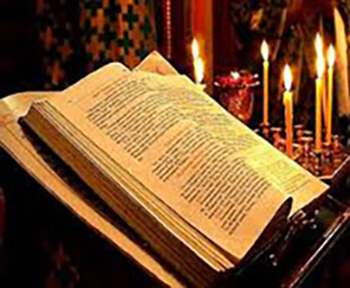
ISAIAH 26:21-27:9
21 For behold, the Lord comes out of His place To punish the earth's inhabitants for their iniquity; The earth will also disclose her blood, And will no longer cover her slain.
1 In that day the Lord with His severe sword, great and strong, Will punish Leviathan the fleeing serpent, Leviathan that twisted serpent; And He will slay the reptile that is in the sea. 2 In that day sing to her, “A vineyard of red wine! 3 I, the Lord, keep it, I water it every moment; Lest any hurt it, I keep it night and day. 4 Fury is not in Me. Who would set briers and thorns Against Me in battle? I would go through them, I would burn them together. 5 Or let him take hold of My strength, That he may make peace with Me; And he shall make peace with Me.” 6 Those who come He shall cause to take root in Jacob; Israel shall blossom and bud, And fill the face of the world with fruit. 7 Has He struck Israel as He struck those who struck him? Or has He been slain according to the slaughter of those who were slain by Him? 8 In measure, by sending it away, You contended with it. He removes it with His rough wind on the day of the east wind. 9
Therefore, by this, Jacob's iniquity will be covered; and this is all the fruit of taking away his sin: When he makes all the stones of the altar like chalkstones that are beaten to dust, wooden images and incense altars shall not stand.
GENESIS 9:18-10:1
18 Now the sons of Noah who went out of the ark were Shem, Ham, and Japheth. And Ham was the father of Canaan. 19 These three were the sons of Noah, and from these the whole earth was populated. 20 And Noah began to be a farmer, and he planted a vineyard. 21 Then he drank of the wine and was drunk, and became uncovered in his tent. 22 And Ham, the father of Canaan, saw the nakedness of his father, and told his two brothers outside. 23 But Shem and Japheth took a garment, laid it on both their shoulders, and went backward and covered the nakedness of their father. Their faces were turned away, and they did not see their father’s nakedness. 24 So Noah awoke from his wine and knew what his younger son had done to him. 25 Then he said: “Cursed be Canaan; A servant of servants He shall be to his brethren.” 26 And he said: “Blessed be the Lord, The God of Shem, And may Canaan be his servant. 27 May God enlarge Japheth, And may he dwell in the tents of Shem; And may Canaan be his servant.” 28 And Noah lived after the flood three hundred and fifty years. 29 So all the days of Noah were nine hundred and fifty years; and he died.
1 Now this is the genealogy of the sons of Noah: Shem, Ham, and Japheth. And sons were born to them after the flood.
#orthodoxy#orthodoxchristianity#easternorthodoxchurch#originofchristianity#spirituality#holyscriptures#bible#old testament#wisdom#saints
3 notes
·
View notes
Text
What Is Crooked Cannot Be Straightened
5/29/23
When I started going to therapy for religious trauma, my therapist directed me to Abraham Piper, a rather famous exvangelical and son of John Piper, a famous evangelical fundamentalist. Abraham Piper's TikTok account was interesting, philosophical, and entertaining all at the same time, and many of his ideas hit home with me, as someone who was floundering with the idea of religious trauma, despite it having been nearly 8 years after my Exit.
One of the tags he used was #abusurdism which I'd never heard of before, and being a curious type of person, I googled it.
"What is absurdism?"
Of course, as you might expect, I found dozens of articles and reddit threads discussing Albert Camus, existentialism, and meaninglessness.
I was hooked.
Meaninglessness had been an appealing concept to me since the first time I read Ecclesiastes, the only book of the bible I ever really liked.
Even now, if you asked me what my favorite book of the bible was, I'd still say Ecclesiastes. When I was young, my reason was that it was beautiful poetry written by a clearly intelligent person who understood the futility of life, and which ended by directing you to trust god.
Now my reason is because Ecclesiastes breaks christianity. It's like a computer virus. As soon as you run ecclesiastes.exe, blue screen.
In Ecclesiastes, the writer concludes that everything is meaningless, therefore, your best bet is to fear god and follow his commandments (cough *philosophical suicide* cough). The ending offers an easy "skip" button.
"Fear god!" christian you might think. "Great, that's all I need to know. I was gonna do that anyway."
This answer is good enough until you read that verse in Romans about how you're supposed to study the scriptures. And then you do study them.
As soon as you really begin to look deeply into Ecclesiastes, one key thing leaps out: if everything is meaningless... so is following god and his commandments. That solution the Teacher offers? Just as meaningless as any other solution.
All of christianity centers around one foundational element: the meaning of everything is god.
But if there is no meaning to everything, if god is not the meaning after all... what does that mean for the entirety of the christian religion?
If you take Ecclesiastes literally, then making the choice to "obey god" is just as meaningless as making a different choice. Even if you choose to "follow god," the method for doing so is meaningless. You could choose to follow the old testament god or the new testament god, you could follow Thor or Allah, you could rename the universe "god" and call it a day—and you get to make up your own "rules" about what following god looks like, and at least philosophically speaking, you're good to go.
Most christians would argue that therefore you must follow the christian scripture, because obviously the bible doesn't contradict itself, because it says so. heh
But this doesn't work. Literally no one follows the scriptures literally. Not even literalists. Because it's impossible. Because the bible doesn't agree with itself about anything.
And even if you find ways to look past all the other contradictions, Ecclesiastes undermines everything else. It puts questions where They don't want questions. It adds flexibility where They don't want flexibility. It adds meaninglessness where They want meaning.
And They can't get rid of Ecclesiastes. Because if They do that, then they're picking and choosing what scripture to follow. And if you can cut and paste Ecclesiastes, then it follows you can cut and paste the rest of the bible, in which case you might as well just throw the whole thing in the trash and start over.
As far as I can tell, the "best" argument against my interpretation of Ecclesiastes is "no, you're misinterpreting it" which... isn't an argument. The very fact that Ecclesiastes demands interpretation in order to "fit" with the rest of christianity, means that I can interpret it however the hell I want.
And I choose to interpret it as an exploration of the meaninglessness of everything that ultimately undermines the whole of christianity.
When faced with ultimate meaninglessness, some people choose to avail themselves of the pleasures of life. Some people choose to work. Some people choose to find meaning in the mundane. Some people create their own meaning. Some people (like Solomon) choose to follow god and obey the king. And some people simply... accept meaninglessness.
And this is the heart of absurdism: choosing to accept meaninglessness as a fact of life, rather than fighting against it, trying to fix it, or trying to solve it.
Everything is meaningless. Utterly meaningless.
Including Ecclesiastes.
Everything is meaningless and that’s okay. Not only is it okay, it's good. Because acceptance often brings peace, freedom, and joy where there was only cognitive dissonance before.
#ecclesiastes#bible#literalist#atheist#atheism#absurdism#absurdist#ex christian#exvangelical#exchristian#philosophy#christian philosophy#the bible is stupid#solomon#everything is meaningless#albert camus#absurdism offers freedom from christianity#cults#cult ideology#the christian cult
18 notes
·
View notes
Text
This may sound odd, but I’ve actually tried to give myself every opportunity to get free from my Christian understanding and convictions. I’ve spent a lot of time reading critics of Christianity and engaging thinkers who have provided what seem to me to be the most compelling alternatives to Christianity. The critics have included scholars who have worked hard to debunk the Scriptures and to provide historical narratives that explain Christianity away, and the alternatives to Christianity have included major religious and philosophical lines of thought.
To the extent that my life has conformed to biblical wisdom for what it means to be human and for how to live life, my life has been enriched, and I have been thankful. My wife would say the same. To the extent our lives have conformed to God’s wisdom, as expressed in the Scriptures of the Old and New Testaments, we are glad. Our regrets all have to do with the ways we have fallen short of that wisdom, misunderstood it, or wandered from it.
I do not mean to suggest that by seeking God’s ways and wisdom, we have enjoyed a trouble-free life or that everything has fallen nicely into place for us. To the contrary, I have found life to be an uphill trek that often refuses to give me what I want, when I want it, or how I want it.
I've been meaning to post quotes from Dr. Horner's new blog since he started it a few months ago. Here's one! ("Wisdom from the Psalmist")
#Dr. Horner is the man I look up to most of anyone I've ever met#Dr. Horner#Christianity#wisdom#apologetics
2 notes
·
View notes
Text
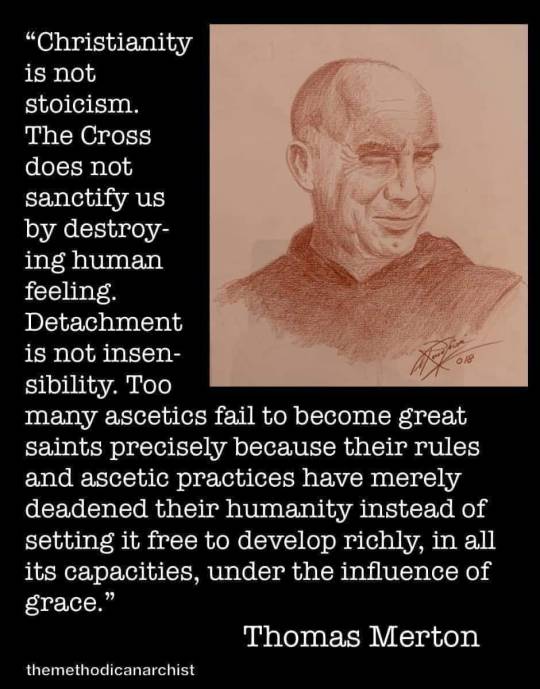
I was finally given the opportunity to obtain and read Thomas Merton's autobiography, "The Seven Storey Mountain." This is an amazing story of one man's search for truth and wisdom in the mid-20th century. It's a great read for anyone who is a seeker of philosophical/theological truths and who is non-judgementally open to the experiences of the world.
Merton eventually becomes an ascetic monk, but this lifestyle does not remove him from the experience and beauty of the world. He passionately absorbs the world and the relationships he develops. Initially, he is a philosophical atheist who struggles to find meaning in this world; what Catholicism and monasticism eventually offer is not a departure or deprivation from this world. Instead, he is able to center himself on God, the ultimate source of Truth and Love. This allows him to balance the experience and relationships he encounters. This book is an amazing journey of one man's reflective pursuit towards truth, beauty, happiness, and meaning.
One passage I want to share in this post is in chapter three, when he undertook his personal journey as an adolescent who just lost his father. He finally encounters the world of prayer and has a mystical experience that will eventually (although not immediately) change him. At that moment, he encounters sacred scripture. Until then, he enjoyed the poetic and philosophical musings of D.H. Lawrence whose religious exposition was tainted by a right-wing political affiliation. Evidently, this author was in favor of dictatorship and social order. This ideological orientation would color his religious lens. Merton recognizes this after he finally reads the Bible for the first time and sees this poet's fallacy. As Merton describes it:
One evening, when I was reading these poems, I became so disgusted with their falseness and futility that I threw down the book and began to ask myself why I was wasting my time with a man of such unimportance as this. For it was evident that he had more or less completely failed to grasp the true meaning of the New Testament, which he had perverted in the interest of a personal and home-made religion of his own which was not only fanciful, but full of unearthly seeds, all ready to break forth into hideous plants like those that were germinating in Germany's unweeded garden, in the dank weather of Nazism.
This passage highlights for me the concern I have for the emerging Christian nationalism that Merton saw developing in Europe of the mid 1930's. His journey towards the truth is to be free of the ideological perversions that filter religious interpretation and to read the joy of the Gospel himself in order to authentically find God in the story of Jesus, the story of service, healing, forgiveness, and reconciliation. This is not the Gospel narrative of Christian nationalism.
The purpose of Christianity is to find the deepest meaning of who you are by connecting oneself with the source of both our entire being and the whole of creation. Scripture and the beauty of our tradition imparts this wisdom on us. Do not let the perversion of Christian nationalism and its hatred for our diverse world defile the beauty of our Christian faith and the movement that Jesus and the early church started. Take time to go to the source and rediscover what it means to truly be a disciple of Christ.
May the wisdom of Merton's experience be a spiritual guide for us in these troubled times.

2 notes
·
View notes
Text

Happy birthday, Baruch Spinoza (Nov. 24, 1632 - Feb. 21, 1677).
Rationalist. Skeptic. Philosopher. Advocate for religious tolerance.
Baruch believed the Bible should be scrutinized in the same way as any other body of literature. He rejected Mosaic authorship of the Pentateuch, a scandalous view at the time. Many of his ideas laid the groundwork for modern biblical criticism.
He was raised in a Portuguese Jewish community in Amsterdam, Netherlands. Eventually he was dismissed from his synagogue as a heretic. During this time, Baruch became friendly with some Mennonites in Amsterdam and The Hague. In fact, Dutch Mennonites were instrumental in getting his writings published.
Quotable quote: "How blessed would our age be if it could witness a religion freed from all the trammels of superstition."
Born in Amsterdam, Netherlands. Died in The Hague.
He never converted to Christianity, but he is buried in the churchyard of the Nieuwe Kerk in The Hague.
The below is often quoted with no direct attribution. It is acknowledged to be at best, a paraphrase of Spinoza's beliefs.
Spinoza:
God would say:
Stop praying.
What I want you to do is go out into the world and enjoy your life. I want you to sing, have fun and enjoy everything I’ve made for you.
Stop going into those dark, cold temples that you built yourself and saying they are my house. My house is in the mountains, in the woods, rivers, lakes, beaches. That’s where I live and there I express my love for you.
Stop blaming me for your miserable life; I never told you there was anything wrong with you or that you were a sinner, or that your sexuality was a bad thing. Sex is a gift I have given you and with which you can express your love, your ecstasy, your joy. So don’t blame me for everything they made you believe.
Stop reading alleged sacred scriptures that have nothing to do with me. If you can’t read me in a sunrise, in a landscape, in the look of your friends, in your son’s eyes … you will find me in no book!
Stop asking me “will you tell me how to do my job?” Stop being so scared of me. I do not judge you or criticize you, nor get angry, or bothered. I am pure love.
Stop asking for forgiveness, there’s nothing to forgive. If I made you… I filled you with passions, limitations, pleasures, feelings, needs, inconsistencies… free will. How can I blame you if you respond to something I put in you? How can I punish you for being the way you are, if I’m the one who made you? Do you think I could create a place to burn all my children who behave badly for the rest of eternity? What kind of god would do that?
Respect your peers and don’t do what you don’t want for yourself. All I ask is that you pay attention in your life, that alertness is your guide.
My beloved, this life is not a test, not a step on the way, not a rehearsal, nor a prelude to paradise. This life is the only thing here and now and it is all you need.
I have set you absolutely free, no prizes or punishments, no sins or virtues, no one carries a marker, no one keeps a record.
You are absolutely free to create in your life. Heaven or hell.
I can’t tell you if there’s anything after this life but I can give you a tip. Live as if there is not. As if this is your only chance to enjoy, to love, to exist.
So, if there’s nothing after, then you will have enjoyed the opportunity I gave you. And if there is, rest assured that I won’t ask if you behaved right or wrong, I’ll ask. Did you like it? Did you have fun? What did you enjoy the most? What did you learn?…
Stop believing in me; believing is assuming, guessing, imagining. I don’t want you to believe in me. I want you to believe in you. I want you to feel me in you when you kiss your beloved, when you tuck in your little girl, when you caress your dog, when you bathe in the sea.
Stop praising me. What kind of egomaniac God do you think I am?
I’m bored being praised. I’m tired of being thanked. Feeling grateful? Prove it by taking care of yourself, your health, your relationships, the world. Express your joy! That’s the way to praise me.
Stop complicating things and repeating as a parakeet what you’ve been taught about me.
What do you need more miracles for? So many explanations?
The only thing for sure is that you are here, that you are alive, that this world is full of wonders.
– Spinoza
25 notes
·
View notes
Note
agreed about the christian interpretations being divergent and reading their own messianic predictions into jewish texts. But both the second temple jews and the rabbinic jews are just also guilty of the exact same thing with texts and traditions that are much older than their religions. basically everybody appropriated from everybody else and Second temple Judaism is a mishmash of different religions thrown together in the Persian period - there's Egyptian, Babylonian and even some Greek traditions all ducktaped together, and fairly poorly to boot. sometimes we have manuscripts of older texts from before the alleged events happened. Which is why they can't quite figure out if Abraham, Jacob, Moses or David is supposed to be the founder, and they've got some other patriarchs like Isaac, Joshua, Caleb, etc that they pay broad lip service to.
but like, even the existence of a "talmud" itself is silly, it's a commentary on a commentary, the torah was the interpretation, then a new generation that came along after the destruction of Jerusalem, and didn't like the theology in it, and worse, didn't have a temple to sacrifice at anymore. and much the same for the prophets, etc. There weren't even prophets in the second temple era, and half of amos and hosea is in a dialect so old you can barely understand it, what the heck do you do with that?
The earliest christian interpretations are worse of course. But i was mostly referring to contemporary confessional (i.e. non-critical) interpreters, both of whom are so far removed from the authorship of the original texts that any claim of continuous, coherent tradition is bunk. Like, if you think there really was a moses and that he led significant number of captives out of Egypt, or had anything to do with the composition of the torah, you're doomed to get everything so absolutely wrong. blind person doesn't see better than the one without eyes.
and like, the critical scholars on thetorah dot com that i read are always complaining about e.g. how many jewish people think the jews built the pyramid when that's not even in the torah. so yeah not buying that jewish people know their scriptures very well at all. and especially because tumblr jewish people dont say anything that even resembles anything i read from actual torah scholars. oh well...
i take issue with your rhetoric
saying "Second temple Judaism is a mishmash of different religions thrown together in the Persian period - there's Egyptian, Babylonian and even some Greek traditions all ducktaped together, and fairly poorly to boot" implies that there are religions or cultures out there that aren't complex integrations of different traditions based on the unique circumstances of local history and the rhetorical and philosophical needs of the time and place they're found in, which is false. it also denigrates some cultures arbitrarily as "impure" or "mongrelized," in a way which is uncomfortably 19th century race science of you.
(also, it's "duct tape," not "duck tape")
the human tendency toward hybridization and amalgamation--what Salman Rushdie called "chutneyfication" in Midnight's Children--is a source of innovation and strength. it's how we get new and interesting cultures. it is a source of value, not a lack.
and like, yes, rabbinic judaism does not produce the same analyses as the historical-critical method applied to the same texts. but crucially, it's not trying to. the historical-critical method and the devotional approach are aiming for two very different things.
and while i have a jaded view of religion in general, i think if you can't understand why anyone could ever get anything out of a devotional approach to religious literature, you're either being deliberately obtuse (and thus pissing on people on purpose), or you are very stupid
17 notes
·
View notes
Text
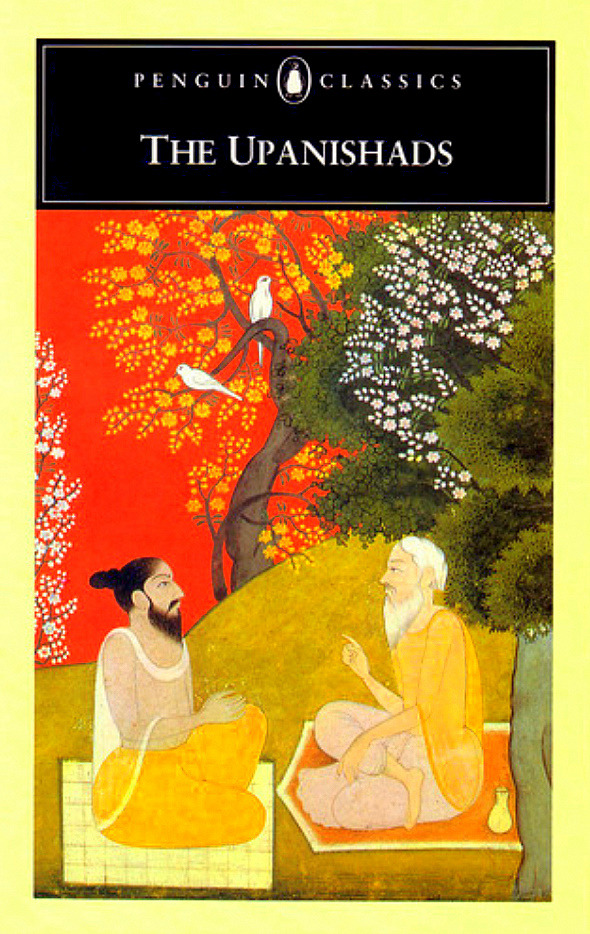
An Brief Introduction to the Upanishads, by James Bean
The term “Upanishad” can be understood to mean: sitting at the feet of a spiritual master or sage of wisdom. One of the world’s most influential books is the Hindu scripture known as The Upanishads, a collection of philosophical and mystical texts, the oldest of which dates back several centuries BCE.
There are eleven major Upanishads, and those are the ones you typically see on bookstore shelves labeled with the name Upanishads. However, as is usually the case, there is more to this story than meets the eye. A good spiritual principal in fact, when it comes to paths and traditions generally is, “There is always more!” It turns out there are really 108 known Upanishads, including Vedanta Upanishads, Physiological Upanishads, Mantra Upanishads, Sannyasa Upanishads, Yoga Upanishads, and no doubt others as well. Apparently, originally at one time there were at least a couple hundred Upanishads. Perhaps the lost or missing ones will turn up in some discovery of ancient texts one of these days. That does happen from time to time. Occasionally there are lost gospels that are found, or Buddhist sutras, Dead Sea Scrolls hidden in caves, Suras of the Quran discovered in the walls of a mosque in Yemen, secret Coptic manuscripts found stashed away underneath the staircase of a monastery in Egypt, or other forgotten scriptures buried for centuries underneath the sands of time that get unearthed.
To some degree, the Upanishads are to the Vedas and Hinduism what the Gnostic gospels are to the Hebrew Scriptures and Christianity. They are the advanced revelation of the mystical teachings given by various sages about the nature of Reality, and contain information about meditation techniques that, if put into practice, can give one the personal and direct experience of the Divine, Paramatma, the Great Invisible Spirit, the Self, the Lord of Love.
Wisdom from the Taittiriya Upanishad on the One Who Became Many:
“The Lord of Love willed: ‘Let me be many!’
And in the depths of his meditation
He created everything that exists.
Meditating, he entered into everything.
He who has no form assumed many forms;
He who is infinite appeared finite;
He who is everywhere assumed a place;
He who is all wisdom caused ignorance;
He who is real caused unreality.
It is he who has become everything.
It is he who gives reality to all.
Before the universe was created,
Brahman existed as Unmanifest.
Brahman brought the Lord out of himself;
Therefore he is called the Self-existent.”
“The Self is the source of abiding joy.
Our hearts are filled with joy in seeing him
Enshrined in the depths of our consciousness.
If he were not there, who would breathe, who live?
He it is who fills every heart with joy.
“Until we realize
The unity of life, we live in fear.
When one realizes the Self, in whom
All life is One, Changeless, Nameless,
Formless,
Then one fears no more.”
(The Upanishads, Eknath Easwaran, Nilgiri Press)
To Read More, Go To:
7 notes
·
View notes
Note
Now before I say anything, please know that I'm not trying to be disrespectful. I'm also not Christian, but I do believe that the Christian God exists.
So uh... Does God just.. hate me?
Cause it kinda feels that way. I've been through a lot, all if it at the hands of people who claim to love me or people who claim to love God.
Why would God let all of it happen? Is it a test? Is it a punishment?
Thanks for reading/answering (if you do). I appreciate it, these questions have been plaguing my mind for years.
“Now before I say anything, please know that I'm not trying to be disrespectful. I'm also not Christian, but I do believe that the Christian God exists.”
You're fine; I'm glad you're reaching out.
“So uh… Does God just.. hate me? Cause it kinda feels that way. I've been through a lot, all if it at the hands of people who claim to love me or people who claim to love God.”
Our Lord does not despise you. First and foremost, He created you and all of us in His image. “And God created man to his own image: to the image of God he created him: male and female he created them.” (Genesis 1:27). He chose to make you in His image. You are His child. He would not have created you in His glorious image if He hated you. Furthermore, He sent His son, Christ, to die for us. “For God so loved the world, as to give his only begotten Son; that whosoever believeth in him, may not perish, but may have life everlasting.” (John 3:16).
“But God commendeth his own love toward us, in that, while we were yet sinners, Christ died for us.” (Romans 5:8).
The Scriptures says- “fear thou not, for I am with thee; be not dismayed, for I am thy God; I will strengthen thee; yea, I will help thee; yea, I will uphold thee with the right hand of my righteousness.” (Isaiah 41:10).
“For I know the plans that I have for you,’ declares the LORD, ‘plans for prosperity and not for disaster, to give you a future and a hope.” (Jeremiah 29:11). Just a few examples that come to mind.
“Cause it kinda feels that way. I've been through a lot, all if it at the hands of people who claim to love me or people who claim to love God.”
People are, well, people. Imperfect, and fallible, at times can be selfish, malicious, etc, and will sometimes cause harm to others. Even if they claim to love God, this does not make them perfect or incapable of wrongdoing, as Christian teachings acknowledge. God has said it, Christ has said it, His Apostles, Saints, and Christian philosophers have all said this. People will make mistakes, have bad days, their personal struggles will influence their behavior, or they simply do not care if their actions negatively affect others. I'm not sure what you're going through, so this is just a broader discussion. But it is humans who have done this, not God; He did not create us to be robots, but to have free will. Every moment, we have the option to choose whether or not to be virtuous. We are instructed to be like Christ, not other people.
“Why would God let all of it happen? Is it a test? Is it a punishment?”
I'm not a prophet; I'm simply a Catholic. I'm not a perfect, all-powerful being either. I simply don't know what God is up to or why He does what He does, and even if I did, I wouldn't understand it. One of my philosophy teachers had us write down how we would design the perfect island, then we went through and pointed out all of the flaws. Simply put, humans are incapable of comprehending and imagining what perfection is. The same is true of God. God is perfect, we aren’t, we cannot fully understand Him. But we can trust what He says and know that He loves us. Many philosophers have proposed theories as to why we suffer. Stoics believe it is an ongoing process of improvement. Others see it as a purification. Alternatively, it’s caused by attachment to the material world. Or a 'push' to adapt to one's surroundings. What matters to me is not 'why' we suffer, but how we choose to deal with it. I'm not very old, but my life has taught me to avoid dwelling too much on the "why" in these types of questions, and instead focus on resolving the problem. After the issue has passed, Looking back on it, it will all make sense, or at the very least, I’ll have a better understanding of it. Again, I'm not privy to your specific situation, and you don't have to tell me, a stranger, everything. I'm just going on general knowledge, and my own experiences.
Many people have asked why, and no definitive answer has been provided because, once again, we are human and have limited knowledge of the world. If no one else can, I don't think I alone will be able to answer the age-old question of "why we suffer." I can tell you that Christ used His suffering to show His love for us, and the power of God. Suffering was used by the Prophets and Saints to demonstrate God's glory to those around them; they went through it with patience and optimism, and they used it to help others.
It is important to remember that Christ has been through what you are going through, suffering and betrayal, and He completely understands it. Others have gone through the same or similar. You are not alone, and these trying times will pass. It's easy to believe that this is your life right now, but it isn't; your life is still going on; this is a part of your life, but it isn't the entirety of it; what you're experiencing now will be a memory in time.
Even though I cannot answer 'why' you are going through what you are going through, I can say-
You are not alone, no one is. You have God on your side, you have your family, friends, and loved ones along with those who can relate and understand what you are going through. We cannot control what will happen in life, but thankfully we don’t have to face it alone.
God will never forsake you. Take this time to talk to Him, and lean on Him. He will carry you through this. “Come unto me, all ye that labor and are heavy laden, and I will give you rest.” (Matthew 11:28).
Check back in on this post from time to time, because other people might add their advice as well.
Peace, and blessings of The Lord be with you.
20 notes
·
View notes